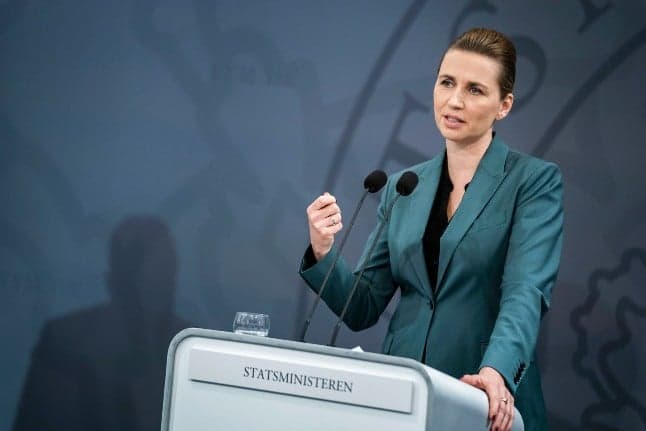Danish PM announces 'gradual' and 'controlled' reopening after Easter

Danish Prime Minister Mette Frederiksen has said that the country could begin a "gradual, quiet and controlled opening" after Easter, in the first sign of an end to the country's strict lockdown.
"If we Danes for the next two weeks - over Easter - continue to stand together at a distance, and if the numbers remain stable and reasonable, then the government will begin a gradual, quiet and controlled opening of our society again on the other side of Easter," Frederiksen said at a press conference on Monday afternoon.
But the Social Democrat leader, whose handling of the crisis has been widely praised by Danes, warned that if people started to relax their efforts too early, there was a risk of a renewed rise in infections which would instead require a shift to even stricter policies.
"If the numbers start to rise again too sharply, or if we start gathering again, inside or outside. Do not keep our distance. Then we won't be able to start to open: perhaps we would have to tighten up even more instead," she said.
READ ALSO:
-
Denmark bans groups of more than ten to fight coronavirus
-
Coronavirus: Denmark turns away 149 travellers after closing border
Frederiksen said that health professionals were starting to see evidence that the decision to close schools, kindergartens, restaurants, bars and cultural centres and other gathering places across the country had succeeded in slowing the spread of coronavirus. It had also, she said, effectively eliminated ordinary influenza.
"Over the past week, the number of admissions has risen slightly more slowly than the week before, and without the explosion in the numbers that we have seen in other countries," she said.
But she warned that the pandemic had not yet peaked, meaning that even as society began taking steps to reopen, the number of cases in hospital could continue to slowly climb.
"Healthcare professionals are going to work even harder. It's going to be a strange time," she said.
Frederiksen suggested that schools and offices would probably reopen first, with borders continuing to be partially closed for much longer.
Initially, the government might have to control when people go to work and school in order to prevent people getting too close to one another on public transport, she said.
There may also need to be changes to the way people work to prevent too many people ever gathering together in one place at the same time.
"The virus will be among us for a long time to come. More will be infected. More will be admitted to hospital. Unfortunately, many will die," she said.
Comments
See Also
"If we Danes for the next two weeks - over Easter - continue to stand together at a distance, and if the numbers remain stable and reasonable, then the government will begin a gradual, quiet and controlled opening of our society again on the other side of Easter," Frederiksen said at a press conference on Monday afternoon.
But the Social Democrat leader, whose handling of the crisis has been widely praised by Danes, warned that if people started to relax their efforts too early, there was a risk of a renewed rise in infections which would instead require a shift to even stricter policies.
"If the numbers start to rise again too sharply, or if we start gathering again, inside or outside. Do not keep our distance. Then we won't be able to start to open: perhaps we would have to tighten up even more instead," she said.
READ ALSO:
- Denmark bans groups of more than ten to fight coronavirus
- Coronavirus: Denmark turns away 149 travellers after closing border
Frederiksen said that health professionals were starting to see evidence that the decision to close schools, kindergartens, restaurants, bars and cultural centres and other gathering places across the country had succeeded in slowing the spread of coronavirus. It had also, she said, effectively eliminated ordinary influenza.
"Over the past week, the number of admissions has risen slightly more slowly than the week before, and without the explosion in the numbers that we have seen in other countries," she said.
But she warned that the pandemic had not yet peaked, meaning that even as society began taking steps to reopen, the number of cases in hospital could continue to slowly climb.
"Healthcare professionals are going to work even harder. It's going to be a strange time," she said.
Frederiksen suggested that schools and offices would probably reopen first, with borders continuing to be partially closed for much longer.
Initially, the government might have to control when people go to work and school in order to prevent people getting too close to one another on public transport, she said.
There may also need to be changes to the way people work to prevent too many people ever gathering together in one place at the same time.
"The virus will be among us for a long time to come. More will be infected. More will be admitted to hospital. Unfortunately, many will die," she said.
Join the conversation in our comments section below. Share your own views and experience and if you have a question or suggestion for our journalists then email us at [email protected].
Please keep comments civil, constructive and on topic – and make sure to read our terms of use before getting involved.
Please log in here to leave a comment.